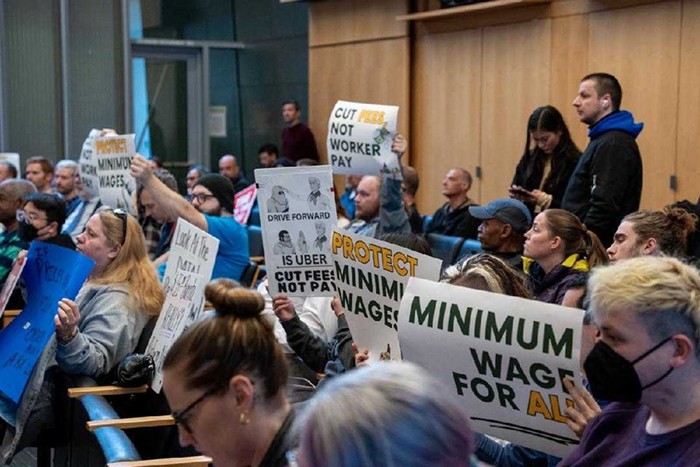You may expect to find your local militia member at a gun rights rally or at an anti-LGBTQ protest, but what about picking up fast food bags and pee-filled Gatorade bottles on the side of the road?
Three Percent Washington, a right-wing anti-government militia group, have adopted three state highways since 2019: A two-mile stretch of State Route 20 in Skagit County, a two-mile section of State Route 2 is Snohomish County, and six miles of State Route 104 just west of the Hood Canal Bridge, which you may see driving from Seattle to Olympic National Park.
Why would any anti-government group want its name on a government sign, and why would they clean government-owned roads for free in the first place?
Amy Marshak, legal director at the Institute for Constitutional Advocacy and Protection at Georgetown University, said the state highway signs draw attention and offer legitimacy, especially if a group is attempting to recruit locally.
“I think these efforts to publicize their [humanitarian] work—Adopt-a-Highway in this case—say, ‘We're not a militia in that way. We're this group of people who are engaged in emergency preparedness and community response and supporting our community. Also, we train with weapons,’” she said.
Free Speech on the Freeway
Adopting a state highway in Washington is a simple agreement. An individual or organization agrees to clean a section of highway up to four times per year for two years. Washington provides the safety vests and trash bags, and the applicant does the work. In exchange, they get a fluorescent green official state roadway sign with their name on it. Yipee.
Every state but Vermont runs an Adopt-a-Highway program, and it's normally a win-win situation. Ideally, the state saves money on labor, the road stays clean, and locals take on some ownership for the benefit of their community.
Sounds great, but not everyone who adopts highways runs altruistic organizations. In the 1990s, not long after Adopt-a-Highway programs began, extremist groups began to use them as an opportunity to place their name before thousands of eyes per year.
For instance, in 1994 the Ku Klux Klan applied to adopt a section of Missouri highway outside of St. Louis. The state’s transportation department rejected its application, and then the Klan sued. A US District Court Judge ruled that the state violated the KKK’s constitutional rights. The state appealed, and the case eventually reached the US Supreme Court, which sided with the white supremacists. Legal arguments against these signs butt up against free speech protections, and rulings that give the government more power over speech could endanger civil liberties.
Without any way of legally removing the signs in Missouri, state legislators renamed the KKK-adopted section of I-55 “Rosa Parks Highway.” In the end, the signs came down anyway because the Klan never bothered to pick up a speck of trash.
The Washington State Department of Transportation said state and federal laws give the agency “no standing” to remove any group’s signs as long as they continue to pick up trash. Three Percent Washington (aka the Washington Three Percent, or 3%WA, etc.) is fulfilling its obligations, the department said.
“Approving a group for the program is in no way a WSDOT endorsement of that group’s mission, only that the group has met all the requirements and is helping to clean up trash,” a WSDOT spokesperson wrote in an email to The Stranger. “While some groups’ participation does cause concern–and the Southern Poverty Law Center and others have raised alarms about particular groups–the courts have repeatedly ruled against state departments of transportations that have denied AAH applications or worked to remove some concerning organizations from the program.”
What Is the Three Percent?
Three Percent Washington, like all Three Percenter groups, don’t answer to a national paramilitary organization. Three Percenterism is an idea.
The name references an unproven claim that only 3% of American colonists fought in the American Revolutionary war to overthrow British rule. (Richard Johnson, an expert on early America and professor emeritus of history at University of Washington, said historians estimate about 40% of colonists actively supported the patriot cause and at least 10% of the population served.) According to The Southern Poverty Law Center, Three Percenters compare today’s US government to colonial British rule, and they believe a small, armed group can resist and overpower a government they perceive as tyrannical.
Some Three Percenters take their views further than others: One supporter threatened to detonate a bomb at Arkansas State University. Two Three Percenters were behind a plot to kidnap Michigan Gov. Gretchen Whitmer. At least seven were arrested and indicted on conspiracy charges from the January 6 insurrection, which led the Canadian government to add Three Percenters to a list of terrorist organizations.
Washington State Three Percenters reject the militia label and have always separated themselves from the national movement. Experts who track the far-right call them a militia group.
“If the Three Percenters in Washington are so different from this national Three Percenters movement, why do they keep that name? And that logo? And that affiliation of the same core ideas?” said Stephen Paolini, an associate regional director for the Anti-Defamation League in the Pacific Northwest.
Three Percent Washington gained traction opposing gun-control measures in Washington, such as this year’s ban on AR-15 sales and the 2018 ballot initiative to raise the age to purchase assault weapons. In 2020, the group held rallies in protest of COVID-19 restrictions, combining messages of medical liberty with Second Amendment rights.
Before one April 2020 rally, a Three Percent Washington leader encouraged people to wear Hawaiian shirts, a nod to the “Big Luau,” which is another expression for the boogaloo, or a future civil war in far-right speak, according to the ADL. In a Facebook post, the group shared the personal information of people who reported businesses for operating outside COVID-19 guidelines, calling the whistle-blowers “brown shirts,” a reference to the SA, a Nazi paramilitary group. That same year, members and supporters took over a local Grange association on Whidbey Island, a long-time community center, and ran for local school boards.
Three Percent Washington became active in anti-trans politics this year, pushing the “groomer” conspiracy alongside fringe groups such as Conservative Ladies of Washington and Gays Against Groomers. The group helped organize an anti-trans rally in Olympia protesting SB 5599, a bill that expanded protections for children seeking gender-affirming or reproductive care in Washington homeless shelters. Three Percenters also joined the anti-trans group Sovereign Women Speak to support a Lynnwood spa that sued the state for the right to exclude transgender women from its facilities. The woman at the center of that case received violent harassment and death threats after the far-right blew up the lawsuit.
When people call Three Percent Washington a militia or criticize its activities, the group’s members and leaders are quick to point to their 501(c)(4) nonprofit status. It’s true that they’re a nonprofit, but tax status isn’t a halo. The designation simply allows a group to raise money without paying taxes while appearing more credible to potential donors.
“What's important for folks to remember is that just because a group is nonprofit, and has been able to maintain that status, it does not necessarily mean that they're doing good work for the community,” said Kate Bitz, a community organizer with the civil rights organization Western States Center. “This could be something that groups apply for in order to legitimize some pretty unpleasant activities.”
In 2021, the ADL’s Center on Extremism released a report that identified a number of extremist groups that spread white supremacist hate and anti-government sentiment with nonprofit status.
For example, Oath Keepers founder Stewart Rhodes appeared on a podcast days before the January 6 insurrection soliciting donations to the Oath Keepers Educational Foundation. In IRS filings, the foundation stated its purpose as giving “veterans an opportunity for continued involvement in community service.” He was later sentenced to 18 years in prison for seditious conspiracy for his role at the Capitol. American Patriot Vanguard III%, whose Three-Percent-inspired members were also involved in the insurrection and several bombing plots around the country, claimed its purpose was to “provide assistance to underserved communities and our veterans.”
The report also found that several extremist groups appeared to be lying about their purpose to obtain a tax exempt status, paying themselves excessive salaries and diverting funds to enrich their friends and family.
Registered nonprofits included VDare, a white nationalist, anti-immigrant blog; the anti-Muslim American Freedom Defense Initiative; and Proclaiming Justice to the Nations, a pro-Israel, anti-Muslim Christian group.
Can States Do Anything?
Paramilitaries are illegal in all US states, including Washington. It’s written right into the constitution that private militaries can’t carry around guns and act like a security force without permission from the state. Law enforcement agencies and prosecutors say the old laws are too archaic to enforce, but they haven’t tried enforcing them, either. Legislators on the West Coast are trying to pass new laws with mixed results.
Last year, the California State Legislature passed SB 834, which allows California’s Franchise Tax Board to revoke an organization’s tax exempt status if the Attorney General determines it has actively engaged in treason, insurrection, seditious conspiracy, or otherwise tried to overthrow the government.
In the last session’s chaotic final days, Oregon lawmakers passed HB 2572. Oregon’s Attorney General can seek a court order if the office has “reasonable cause” to believe a person or group has, or is about to, engage in paramilitary activity. The bill also empowers people injured by paramilitary activity to sue those groups.
The Legislature also passed HB 2772, which makes domestic terrorism a felony, harshening punishment for crimes that were already illegal. The ACLU of Oregon released a statement calling the law unnecessary and vague, potentially empowering law enforcement to punish protest as terrorist activity. Giving police forces additional leeway is a serious concern, considering the tactics Portland police used on protesters in 2020, including spying and tear gas–not to mention federal agents abducting protesters in unmarked vans. The ACLU and 23 civil liberties organizations wrote a letter to warn lawmakers of those implications.
This year lawmakers in Washington, which the ADL ranked fifth in the nation for white supremacist propaganda in 2021, attempted to pass HB 1333, which would have created a committee within the office of the Attorney General to build on its 2022 study on domestic extremism and develop a response to misinformation, disinformation, and radicalization modeled like a public-health response. The bill died in committee after conservative groups mobilized against it.
Bill sponsor Rep. Bill Ramos of Issaquah said that study and the later bill came from conversations with cosponsor Rep. April Berg from Snohomish County about dealing with extremism in their Legislative Districts.
“What you find is our country is not designed to deal with terrorism from within,” he said.
On May 31, 2020, hundreds of men, many of whom carried guns and belonged to far-right groups, patrolled downtown Snohomish after online rumors of an impending visit from Antifa. In another case, Berg said an unlicensed barber in Snohomish, who defied the COVID-19 stay-at-home order and got slapped with a $90,000 state fine, had militia members protecting his business from state interference.
“That all led to us saying, ‘Look, we need something else,’” she said. “We don't have the tools that we need to deal with extremism when it's in our own communities.”




















